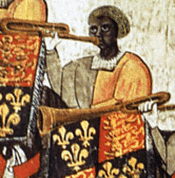 John Blanke, 1511.
John Blanke, 1511. London, 27th July 2012
Dear BBC News Magazine,
I was pleased to see Michael Wood’s article on ‘Britain's first black community in Elizabethan London’ (http://www.bbc.co.uk/news/magazine-18903391) on your magazine last week, as it brought a fascinating subject to your readers’ attention (in much greater depth than that night’s Great British Story).
However, I feel that it did not tell the whole story. Having recently completed a D.Phil. thesis on ‘Africans in Britain, 1500-1640’ at Oxford University, in which I found evidence of over 350 Africans living in Britain during that time, I wanted to add to and comment on what Wood had to say.
Firstly, I would question Wood’s use of the term “community”. How do you define “community”? A handful of people living in the same area? Though they may have had the same colour skin, they may not have socialised, or even spoken the same language. Kathy Chater’s book Untold Histories, on the 18th century black population questions the use of this term even then.
My study showed that not only were Africans in Britain not slaves, but some were paid wages or even worked independently as craftsmen (I found a needlemaker and a silkweaver) or died leaving property.
They were not just musicians before Elizabeth I’s reign. Some were courtiers, but there was also a soldier in Exeter in 1522, a man buried in Northamptonshire in 1545, a diver in Southampton in 1547-8 and a needlemaker in Cheapside c.1554-8.
Africans were not only living in London- they were in Southampton, Bristol and Plymouth, but also in less likely places, from Hull to tiny villages like Stowell in Somerset or Bluntisham-cum-Earith in Cambridgeshire.
Wood asserts that two of Shakespeare’s greatest characters are black. We can assume he means Othello and...Aaron from Titus Andronicus? The latter is not usually described as “great”- as he is cruel, lascivious and murderous- even killing his own son!
The discussion of ‘Lucy Negro’ is misleading and conflates various unrelated biographies. This was a fairly common nickname, given to various women with dark hair in the literature and records of the period. There is no evidence of a real African woman of this name. In fact I found more evidence of African men using London prostitutes than African women working as prostitutes.
In his comments on the attempt to transport Africans to Lisbon in 1596 and 1601, Wood concludes “Whether this actually happened is unclear.” In fact another letter in the Hatfield archives, from the merchant who had petitioned for permission to transport the Africans, Caspar Van Senden, shows that he was unsuccessful, as I explain in my full analysis of the situation in my article ‘Caspar Van Senden, Sir Thomas Sherley and the “Blackamoor” project’, Historical Research, 81, no.212 (May 2008), pp. 366-371.
Some factual errors:
The”1602” letter of Denis Edwardes that Wood uses to prove Turnbull Street’s notoriety was in fact written in May 1599 (It is at The National Archives, TNA, SP 12/270/119).
The figure of 20,000 black servants in 18th century London was suggested by the
Gentleman’s Magazine in 1764. Modern estimates are more conservative, putting the figure at between 10,000-15,000.
Wood says that “In 1599, for example, in St Olave Hart Street, John Cathman married Constantia "a black woman and servant".” Where is this quote from? The parish register (http://www.history.ac.uk/gh/baentries.htm) says only that her surname was “Negrea”- I wasn’t sure this was clearly an African. I did however find 6 other records of marriages, 3 inter-racial (including 1617 Curres/Person mentioned here) and 3 between two black partners.
I would like to end by thanking Michael Wood and the editor that commissioned him for bringing this subject to greater prominence- the article has at time of writing been shared 3487 times, and no doubt many more saw the TV programme. I realise that a short article cannot do the subject justice, and hope that further airtime will be given to this vital part of our shared history in the future.
Yours sincerely,
Dr. Miranda Kaufmann
 RSS Feed
RSS Feed
